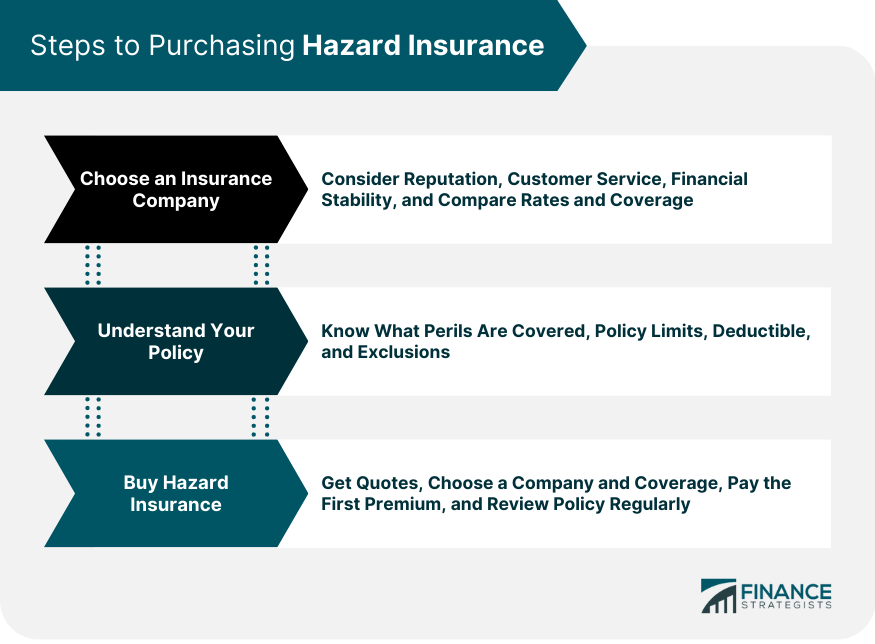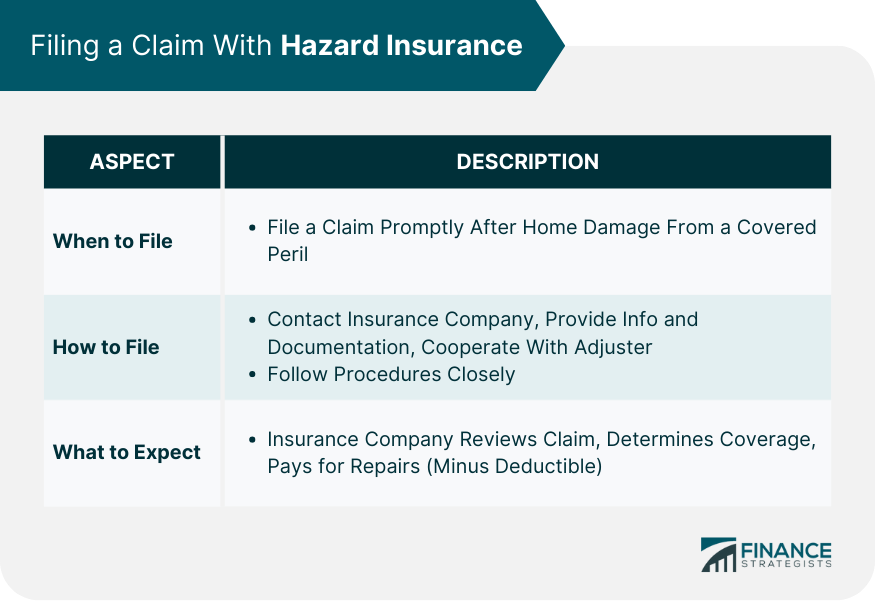Hazard insurance is a type of coverage that protects homeowners against physical damage to their property. This damage could be caused by a variety of hazards, such as fires, storms, or vandalism. The specific hazards covered will depend on the details of the insurance policy. Hazard insurance is crucial for homeowners because it provides financial protection against unexpected damage to their property. Without this coverage, homeowners could face significant financial hardship if their home is damaged or destroyed by a covered hazard. It's an essential part of managing risk as a homeowner. Hazard insurance typically covers physical damage to the structure of your home caused by covered hazards. This can include damage from fire, wind, hail, lightning, vandalism, and other perils. The exact coverage will depend on the specifics of your policy and may vary between insurance providers. While hazard insurance covers a wide range of potential damages, it does not cover everything. For example, most policies do not cover damage caused by floods or earthquakes. Additionally, damage resulting from neglect or poor maintenance is typically not covered. It's important to read your policy carefully to understand what is and isn't covered. While hazard insurance covers physical damage to your home from specific perils, homeowners insurance is a broader policy that also includes liability coverage and often personal property coverage. Hazard insurance is typically a part of a homeowners insurance policy, not a standalone policy. Understanding the difference can help you ensure you have the right coverage for your needs. Several factors can influence the cost of your hazard insurance premiums. These can include the location of your home, the age and condition of your home, the amount of coverage you need, and your deductible amount. Additionally, if your home has certain risk-reducing features, like a security system or fire-resistant materials, this could potentially lower your premiums. There are several strategies you can use to potentially lower your hazard insurance costs. These can include shopping around for the best rate, raising your deductible, improving your home's safety features, and maintaining a good credit score. Regularly reviewing your policy and comparing rates can also help ensure you're getting the best deal. When it comes to choosing an insurance company for hazard insurance, it's important to consider factors such as the company's reputation, customer service, and financial stability. You should also compare rates and coverage options from several different companies. Doing your research can help ensure you choose a company that will be reliable and provide the coverage you need. Understanding your hazard insurance policy is crucial to ensuring you have the coverage you need. This means reading the policy carefully and asking questions about anything you don't understand. You should know what perils are covered, what the policy limits are, and what your deductible is. It's also important to understand what is not covered by your policy. The process of buying hazard insurance typically involves getting quotes from several insurance companies, choosing a company and coverage level, and then paying your first premium. You may also need to have your home inspected by the insurance company. Once your policy is in place, it's important to review it regularly and update it as needed to reflect changes in your home or personal circumstances. If your home is damaged by a covered peril, you should file a claim with your insurance company as soon as possible. This typically involves contacting your insurance company, providing information about the damage, and submitting any necessary documentation. You may also need to allow an insurance adjuster to inspect the damage. It's important to follow your insurance company's procedures closely to ensure your claim is processed smoothly. After filing a claim, your insurance company will review the information and determine whether the damage is covered by your policy. If your claim is approved, the insurance company will pay for the repairs, minus your deductible. The exact process and timeline can vary depending on the insurance company and the extent of the damage. It's important to maintain communication with your insurance company throughout the process. Hazard insurance plays a crucial role in protecting homeowners from significant financial loss due to damage to their property. By covering a wide range of perils, from fires to storms, hazard insurance provides peace of mind and financial security. However, it's important for homeowners to understand their policy, including what is and isn't covered, to ensure they have the protection they need. For homeowners, purchasing hazard insurance is an important step in protecting their investment. It's crucial to choose a reputable insurance company, understand your policy, and know how to file a claim. Regularly reviewing and updating your policy can also help ensure you have the right coverage as your needs change. Remember, the goal of hazard insurance is to help you recover financially if your home is damaged, so it's worth taking the time to get it right.What Is Hazard Insurance?
Understanding the Basics of Hazard Insurance
What Does Hazard Insurance Cover?
What Does Hazard Insurance Not Cover?
How Does Hazard Insurance Differ From Homeowners Insurance?
The Cost of Hazard Insurance
Factors Influencing Hazard Insurance Premiums
Ways to Lower Hazard Insurance Costs
How to Purchase Hazard Insurance
Choosing an Insurance Company
Understanding Your Policy
The Process of Buying Hazard Insurance

Filing a Claim With Hazard Insurance
When and How to File a Claim
What to Expect After Filing a Claim

Final Thoughts
Hazard Insurance FAQs
Hazard Insurance is a type of coverage that protects homeowners against physical damage to their property caused by specific hazards like fires, storms, or vandalism. The specific hazards covered depend on the details of the insurance policy.
Hazard Insurance typically covers physical damage to the structure of your home caused by covered hazards. This can include damage from fire, wind, hail, lightning, vandalism, and other perils. The exact coverage depends on the specifics of your policy.
Hazard Insurance covers physical damage to your home from specific perils, while homeowners insurance is a broader policy that also includes liability coverage and often personal property coverage. Hazard Insurance is typically a part of a homeowners insurance policy, not a standalone policy.
Several factors can influence the cost of your Hazard Insurance premiums. These can include the location of your home, the age and condition of your home, the amount of coverage you need, and your deductible amount. Risk-reducing features, like a security system or fire-resistant materials, could potentially lower your premiums.
If your home is damaged by a covered peril, you should file a claim with your insurance company as soon as possible. This typically involves contacting your insurance company, providing information about the damage, and submitting any necessary documentation. You may also need to allow an insurance adjuster to inspect the damage.
True Tamplin is a published author, public speaker, CEO of UpDigital, and founder of Finance Strategists.
True is a Certified Educator in Personal Finance (CEPF®), author of The Handy Financial Ratios Guide, a member of the Society for Advancing Business Editing and Writing, contributes to his financial education site, Finance Strategists, and has spoken to various financial communities such as the CFA Institute, as well as university students like his Alma mater, Biola University, where he received a bachelor of science in business and data analytics.
To learn more about True, visit his personal website or view his author profiles on Amazon, Nasdaq and Forbes.











